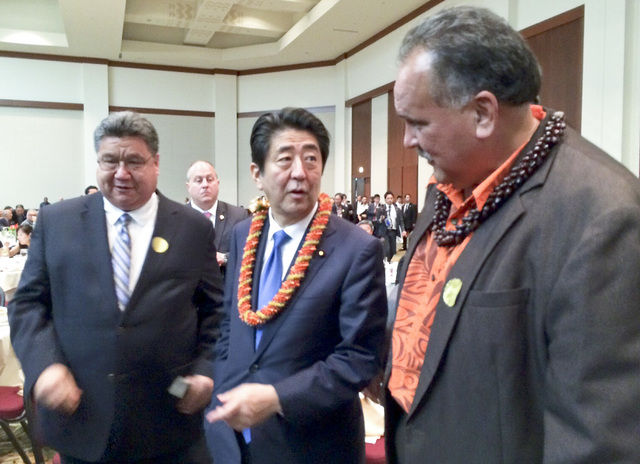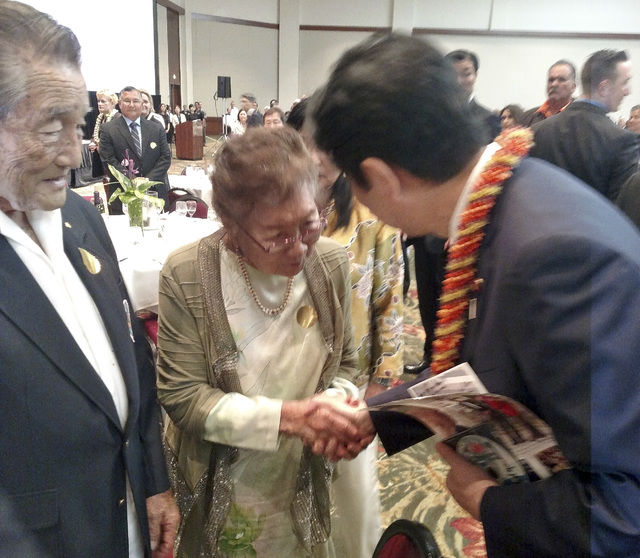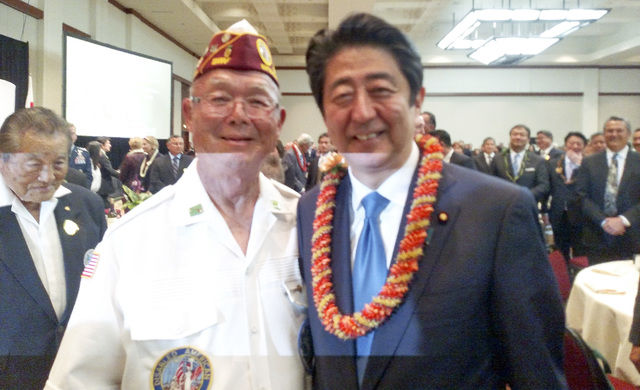Japan Prime Minister Shinzo Abe kept repeating, “Tabuse, Tabuse,” even while he walked among the crowd at the Welcoming Ceremony at the Hawaii Convention Center, said Mabel Hashisaka. “He found out that his grandfather came from the same place —
Japan Prime Minister Shinzo Abe kept repeating, “Tabuse, Tabuse,” even while he walked among the crowd at the Welcoming Ceremony at the Hawaii Convention Center, said Mabel Hashisaka.
“He found out that his grandfather came from the same place — Tabuse in the Yamaguchi Prefecture, Japan — as Norman’s father,” Mabel said. “Even after he moved on, he kept repeating, ‘Tabuse, Tabuse.’”
Norman, Mabel Hashisaka, their daughter Ruth, and Ed Kawamura, the commandant for the Kauai Veterans Council, joined Kauai dignitaries, including Hawaii Senate President Ron Kouchi and Mayor Bernard Carvalho, Jr. in meeting the prime minister during Abe’s historic trip to Hawaii.
“This was quite an honor,” Kawamura said. “Art Umezu of the Mayor’s Office said the organizers extended invitations to nissei veterans. Norman and Mabel were the only ones who could travel to the event, and Umezu said I needed to go to represent all the nissei who were not capable of traveling to the event. And, I’m Japanese.”
Kawamura was surprised that they were able to personally greet Abe.
“We were the first ones he saw when he came out of the door,” Kawamura said. “He just came out and walked over and started talking to us, shaking our hands. This was a wonderful feeling, the prime minister coming out and going straight to the veterans.”
Ruth Hashisaka, who claimed she was “just a driver because her parents couldn’t drive,” said she felt honored to be able to meet the Japanese leader.
“Mrs. Dawn Amano-Ige, the first lady of Hawaii, was the first person to greet the prime minister when he came out of the door,” Ruth said. “She had to present him with a cigar lei and said she was really nervous. But this was a very sincere meeting with good speeches from both President Barrack Obama and Prime Minister Shinzo Abe. Both leaders are really about the future.”
Carvalho noted that Prime Minister Abe visited Kauai at 18 years of age.
“The whole experience of meeting Prime Minister Abe was very moving,” Carvalho said. “You could really feel the emotion in the audience — especially for the veterans — when Prime Minister Abe spoke about peace, healing, and building bridges between our two countries.”
Norman, a veteran with the Military Intelligence Service, said one of the primary reasons for Abe’s visit was to express his condolences.
“He was very sincere,” Norman said. “His condolences were very broad — not just to the veterans, but to those who died, and their families. He is very good. He said we must never repeat the horrors of war, and he hopes the children of Japan and the United States always remember Pearl Harbor as a reminder to strive for peace.”
He said the prime minister is hoping for a better future.
“For me, that was the big thing,” Norman said. “To me, war is a terrible thing — all the nations involved put up their young, healthiest, strong and intelligent people to be trained in how to fight, kill. The end result is trillions of our assets are lost — millions of our young people. And even after the war, many more people suffer. War is a foolish thing to have because no one really wins — everyone loses. The big thing I sense from being here is to move to peace. The prime minister was very sincere. War pau, main thing now is for our children, grandchildren.”




